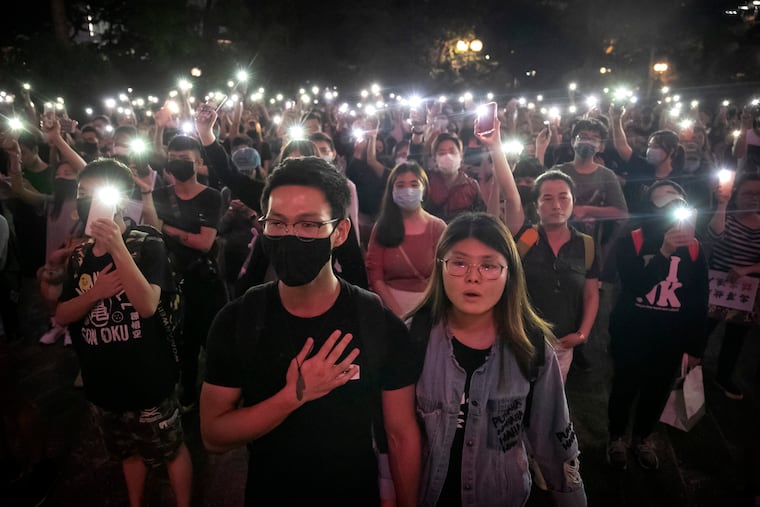I’m going to China to write about trade, tech, and the new Cold War | Trudy Rubin
As China rises, and offers a new authoritarian model, will America be able to compete?

I was on a plane to Beijing as the House of Representatives was voting to formally open an impeachment inquiry into the president. In some ways, I felt I was heading for the more important story.
China’s rise, and the furious competition between Washington and Beijing, will define how the world looks in the coming decades. As we wrestle with our internal political strife, China is pushing ahead in its efforts to achieve global technological superiority by 2030. It is moving into the economic and political vacuum created by the retreat from global leadership by a weary America and President Donald Trump.
It’s as if we are watching a far less benign version of post-World War II America, a China that is mesmerizing the world with its drive and energy — and its billions of dollars in development loans. Except that China is promoting an authoritarian model made attractive by its economic success, just as Western democracies have become less attractive.
Instead of the Marshall Plan, we get China’s massive infrastructure loans and investments in Asia, the Middle East, Africa, Latin America, and even in Europe, that dwarf anything an isolationist White House puts forward. And money talks, as Americans have seen with Chinese pressure on the NBA, on film studios, and sports brands to refrain from speech or imagery that offends Beijing.
Until recently, those democracies assumed the Chinese system would eventually converge with ours as China grew richer. That conceit has vanished since the emergence of President Xi Jinping, who makes no secret of his desire for global dominance.
Now American China scholars are furiously debating what China really wants to do with its economic and military might.
My strangest trip in three decades
It’s a fascinating time to visit Beijing, Shanghai, and Shenzhen (and then on to Hong Kong and Taiwan) to get a better idea of how Chinese view the competition with America, and how they envision China’s role in the world.
I have a feeling I am embarking on the strangest trip in my three decades of traveling to China. On my first visit in 1986, the atmosphere was so wide open to foreigners, especially Americans, that people stopped me on the street and poured out stories of their experiences during the Cultural Revolution.
That openness diminished somewhat over the years. But last year was the first time I felt a growing reluctance among think tankers and experts to speak openly to an American. Once-active civil society groups had been shut down. Yet last year I also met enthusiastic young start-up entrepreneurs who seemed un-phased by government surveillance and optimistic about their futures. Ditto for young professionals with good economic prospects.
» READ MORE: Will China eclipse US in technology by 2025? I Trudy Rubin
Some U.S. officials advocate decoupling the enormous web of economic and other ties that bind the world’s two largest economies, a process hard to imagine and costly to both countries. Vice President Mike Pence just said decoupling is not the U.S. aim, but the nature of our future relations is in play as many talk of a new Cold War.
Exploring tech and trade
So I’ll be looking at how the current trade and tech wars appear from China. (President Trump isn’t wrong in challenging Beijing on unfair trade practices and technology theft. But he has rejected the kind of joint strategy with America’s allies in Europe and Asia that might convince Beijing it must play by fair rules.)
I plan to visit the home campus of Huawei, the telecoms giant that the Trump administration is trying to ban from selling 5G (fifth-generation wireless) equipment in the United States and abroad due to security concerns. The battle over Huawei has come to symbolize the war for technological supremacy between Washington and Beijing.
The key question that rarely gets asked, however, is why the United States does not have its own Huawei. The Beijing government has rallied the country around the technology race, while America failed to do likewise. And when it comes to the competition for uses of AI (artificial intelligence), I’ll be looking at China’s astonishing array of e-commerce applications, from ubiquitous apps that deliver and pay for everything, to surveillance cameras.
China’s Philadelphia connections
I’ll also be looking at an issue that I’ve followed since my first visit, the very gradual advance of legal reform in China in ways that held some promise that Communist Party officials might one day be subject to law, not use laws as a political cudgel. That slow progress has gone into reverse over the last six years. However, Temple University’s joint Rule of Law program with Tsinghua University, which I’ll visit, is celebrating its 20th anniversary.
Two other Philadelphia links I’ll check out: The Philadelphia Orchestra, beloved in China since its first visit in 1973, will send four players to give master classes in Shanghai, in a demonstration that music still has the power to transcend politics. And I’ll be attending a gala at the Ullens Center for Contemporary Art in Beijing, led by Philadelphian Philip Tinari, to catch up on cultural trends.
» READ MORE: Philadelphia Orchestra's music soothes U.S.-China tensions
Visiting China, with its energy and contradictions, is a reminder that the real question is whether America is up to the challenge of competing with a rising China. Or whether our internal divisions and lack of a unifying leader will take us out of the game.